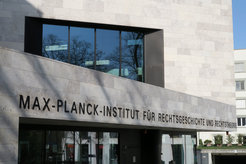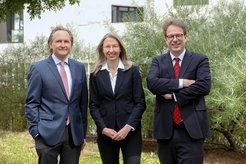The Institute

The Institute’s research examines law, its constitution, legitimation, transformation and practice. Particular attention is paid to the positioning of historical forms of ‘law’ in the context of other normative orders. The establishment of a department engaged in developing a multidisciplinary legal theory in 2020 substantially expands the Institute's engagement with issues of legal theory.
The Institute is today able to build on its over 50-year history. While the emphasis was placed on the history of private law in Europe at the time Helmut Coing established the Institute in 1964, subsequent directors – Walter Wilhelm, Dieter Simon, Michael Stolleis and Marie Theres Fögen – gradually extended the fields of activity to other research areas, such as the history of public law, international law and criminal law. For quite some time, a great deal of importance was attached to the evaluation of legislation and key scholarly reference texts. Today, however, the focus is primarily on working with other relevant source materials. Whereas emphasis was traditionally placed on the legal history of Europe, under the direction of Thomas Duve (since 2009) and Stefan Vogenauer (since 2015) the Institute has increasingly expanded its scope to also include other regions. Comparative, global, and global-historical perspectives are employed to overcome the analytical divisions separating these regions, to critically evaluate certain fundamental assumptions about European legal history and legal theory, and, furthermore, to trace out Europe as a global region from a legal historical perspective. The establishment of a third department in September 2020 enlarged the Institute’s previously predominantly legal-historical focus to now also encompass research on legal theory.
Roughly 60 researchers from various regions of the world are working in the three departments – European and Comparative Legal History (Department Stefan Vogenauer) and Historical Regimes of Normativity (Department Thomas Duve) and Multidisciplinary Theory of Law (Department Marietta Auer) – and the currently two Max Planck Research Groups.

Many research projects are carried out together with researchers in Germany and abroad, in some cases within the framework of formal co-operations. Visitors coming to Frankfurt to do their research stays bring the Institute into contact with a variety of different academic discourses. Its research, publications and co-operations make it a point of reference for the national and international scientific communities. With its specialist library containing around 490,000 printed media units, it offers unparalleled working conditions for legal-historical research. The range of media and services in the virtual reading room are constantly being developed and expanded. Some of the Institute’s research output is reflected in its book series, the journal Rechtsgeschichte - Legal History and further publications published by the Institute. The research and work carried out by the Institute is evaluated by an Advisory Board, while a friends’ association support and promote its activities. Further information about this work is available online in our Activity Reports.
The Institute has been based in Frankfurt am Main since its founding. The city offers an inspirational environment for the Institute and its visitors. Inseparably linked with German (legal) history as an imperial palace, as a venue for important synods in the Carolingian period, as a free imperial city and the site of elections of German kings, and later as the seat of the St Paul’s Church parliament, today Frankfurt is not only a financial and economic centre, but it is also home to cultural institutions of international renown, museums and a major book fair. The Goethe University Frankfurt is home to the largest German institute for legal history of any university, where a wide range of research is conducted in the fields of law, history and the humanities. Transregional co-operations in the areas of research and support at the graduate level – also within the context of Max Planck Law – all contribute to making Frankfurt a hub in the global network of fundamental research in legal scholarship.

